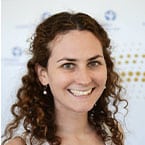AACR Maximizing Opportunity for New Advancements in Research in Cancer (MONARCA) Grant for Latin America
The AACR Maximizing Opportunity for New Advancements in Research in Cancer (MONARCA) Grant for Latin America represents an AACR initiative to address this need by promoting and supporting early career investigators in Latin America to establish a successful career path in cancer research, thereby increasing and sustaining a cadre of talented cancer researchers in Latin America.
2025 grantees

Scientific Statement of Research
Colorectal cancer (CRC) is the third most commonly diagnosed malignancy and the second leading cause of cancer-related deaths worldwide. Although immune checkpoint blockade therapies have achieved long-term responses in several malignancies, their clinical benefit is still limited in CRC. Thus, identification of novel biomarkers and immune escape mechanisms, and the design of additional therapeutic modalities for CRC are urgently required. Galectin-1 (Gal-1), an evolutionarily-conserved glycan-binding protein, has emerged as a key player in immune evasion programs. Dr. Cagnoni seeks to investigate the dual role of Gal-1 on CRC — both as a biomarker for immunotherapy response and as a novel immunotherapeutic target.
Biography
Dr. Cagnoni received his undergraduate degree in chemistry from Universidad de Buenos Aires (UBA), Argentina. He then earned his doctorate studying the synthesis and biological activity of multivalent galectin ligands bearing thiosugars, conducting his research at both UBA and the Université de Picardie Jules Verne in France. During his postdoctoral work at IBYME-CONICET, he studied mechanisms underlying the immunomodulatory activity of milk oligosaccharides. He is currently an associate researcher at IBYME-CONICET in Buenos Aires, Argentina, and an associate professor at UBA. His research focuses on galectin-glycan interactions in inflammatory and neoplastic intestinal pathologies, focusing on the design of selective inhibitors and their therapeutic relevance.
Acknowledgement of Support
“Receiving the 2025 AACR MONARCA grant for Latin America marks a milestone in my scientific research career. I am honored and humbled to have been given this remarkable opportunity, which will allow us to explore the effect of targeting Galectin-1 glycocheckpoint to overcome immunotherapy resistance in colorectal cancer.”

Scientific Statement of Research
T-cell lymphomas (TCL) are a group of aggressive hematologic malignancies with limited treatment options and poor prognosis. Histone deacetylase inhibitors (HDACi) have emerged as promising therapies for TCL, although only 30 to 45% of patients achieve a complete response. Clinical response has been linked to increased chromatin accessibility in malignant cells. Preliminary findings from Dr. Cayrol indicated that thyroid hormones (TH) promote TCL progression through integrin αvβ3 signaling. Given that THs also regulate chromatin accessibility in various tissues, she aims to determine whether TH-driven epigenetic changes affect oncogenic pathways and impact sensitivity to HDACi in TCL.
Biography
Dr. Cayrol received her doctoral degree (summa cum laude) from the University of Buenos Aires in Argentina and completed postdoctoral training at Weill Cornell Medicine in New York City and the Institute of Biomedical Research in Argentina. Since 2018, she has been a CONICET researcher, dedicated to the study of the molecular and cellular mechanisms driving tumor progression and therapy resistance, mainly focused on hematological malignancies.
Acknowledgement of Support
“It is an honor and a meaningful opportunity to receive the AACR MONARCA Grant. This award not only recognizes my commitment to scientific research in the oncology field but also promotes the consolidation of my scientific career in Latin America, allowing me to advance high-quality research in Argentina.”

Scientific Statement of Research
A significant proportion of patients remain unresponsive to or experience only transient benefits from immunotherapy. Dr. Dalotto-Moreno focuses on understanding the role of Galectin-1 (Gal1), an endogenous glycan-binding protein with immunomodulatory functions, in mediating resistance to PD-1 blockade and CAR-T cell therapies. He aims to identify the transcriptomic correlates of Gal1-induced T cell exhaustion that may underlie resistance to anti-PD-1 therapy, using single-cell transcriptomic analyses. Additionally, he plans to investigate how Gal1-dependent, glycosylation-mediated circuits affect CAR-T cell functionality in preclinical solid tumor models and to generate glycoengineered chimeric antigen receptor (CAR) T cells lacking specific O-glycans to block the inhibitory effects of Gal1.
Biography
Dr. Dalotto-Moreno was born in Buenos Aires, Argentina. He earned his master’s degree in biology from the University of Buenos Aires. He completed his doctoral research in the field of cancer immunology, focusing on the role of regulatory Foxp3⁺ T cells in promoting metastasis of triple-negative breast cancer. During his postdoctoral training, he investigated the role of Galectin-1 in shaping antitumor immune responses and modulating the efficacy of immunotherapeutic strategies. Currently, as an assistant investigator and glycoimmunologist, his research aims to enhance antitumor immunity by selectively targeting Galectin-1–glycan interactions on CD8⁺ T cells, paving the way for novel therapeutic approaches.
Acknowledgement of Support
“I am deeply honored to receive this career-defining grant from the AACR MONARCA Grant for Latin America. This support will significantly advance my research and professional development, providing access to enriching networking opportunities. Most importantly, the outcomes of this project will bring me closer to achieving my goal of developing novel therapeutic strategies for cancer patients.”
2024 grantees

Scientific Statement of Research
Adult T-cell leukemia/lymphoma (ATLL) is an aggressive blood cancer caused by the human T-cell leukemia virus type I (HTLV-1). Dr. Castro Uriol plans to study the clinical, viral, and molecular features of Peruvian HTLV-1 carriers in a prospective cohort over a 2-year period. Proviral load and T-cell clonality will be quantified, and DNA sequencing will be conducted in samples from four different family pedigrees of patients with a family history of ATLL who are (or are not) infected by HTLV-1. In addition, Dr. Castro Uriol plans to develop an algorithm to help predict which patients infected by HTLV-1 are at higher risk of developing leukemia or lymphoma.
Biography
Dr. Castro Uriol is a medical oncologist, currently holding a clinical researcher position at the Universidad de San Martín de Porres and an assistant professor position at the Hospital Nacional Edgardo Rebagliati Martins in Lima, Peru. Additionally, she is a co-founding member of the Grupo de Estudio Latinoamericano de Linfoproliferativos (GELL group). Her research focuses on gaining a deeper understanding of the molecular biology underlying virally-mediated malignancies such as HTLV-1 and EBV.
Acknowledgment of Support
“I believe this project will not only enhance our understanding of this devastating disease but also pave the way for the development of novel drugs and vaccines through antigen discovery, ultimately improving the prognosis for our patients. Importantly, the funding provided by AACR exclusively for Latin America offers invaluable opportunities for young researchers who belong to resource-limited settings to immerse themselves in the path of cancer research and become recognized leaders in the scientific community in the future.”

Scientific Statement of Research
Dr. Guimaraes aims to overcome limitations in chimeric antigen receptor (CAR) T-cell therapy by exploring the use of lipid nanoparticles (LNPs) to carry mRNA to induce CAR expression. Current CAR T-cell production relies on costly and potentially adverse viral vectors. LNPs offer a promising alternative due to their ability to efficiently deliver nucleic acids. In this study, he plans to synthesize mRNA encoding a CAR and load the mRNA into LNPs (LNP-CAR). These LNPs will be used to generate CAR T cells, which will then be evaluated for activation and cytotoxicity against solid tumor cells in vitro. Additionally, the efficacy of LNP-CAR T cells will be assessed in vivo, with or without vascular normalization of the tumor microenvironment. Successful completion of this research will demonstrate the potential of nanoparticle-based mRNA delivery for CAR T-cell therapy against solid tumors.
Biography
Dr. Guimaraes completed his bachelor’s degree in pharmacy, master’s degree in biopharmaceutical innovation, and doctorate in chemistry at the Federal University of Minas Gerais (UFMG), Brazil. As a postdoctoral fellow at Massachusetts Institute of Technology, he developed a nanoparticle platform to deliver nucleic acids. Currently an assistant professor in the Department of Physiology and Biophysics at UFMG, he focuses on innovative drug delivery systems, particularly to deliver peptides, small molecules, and gene therapeutics, to target cancer, arboviruses, and neglected diseases.
Acknowledgment of Support
“This grant is crucial for my career as an investigator in Latin America as it provides support to conduct innovative studies in CAR T-cell therapy using lipid nanoparticles for cancer treatment. It grants me access to resources and networking opportunities, accelerating my professional growth and scientific progress in the field.”

Scientific Statement of Research
In Argentina, the standard of care treatment for HER2-positive breast cancer, trastuzumab, is administered without biomarker guidance. Unfortunately, a third of the patients do not respond. Dr. Mercogliano previously demonstrated that TNFα-induced mucin 4 expression causes trastuzumab resistance. Thus, mucin 4 expression may be a predictive biomarker of poor response to therapy. In this project, she plans to develop a biomarker panel that includes mucin 4 by conducting spatial transcriptomics in trastuzumab-treated HER2+ breast cancer samples.
Biography
Dr. Mercogliano received her undergraduate degree in biology from Universidad de Buenos Aires (UBA), Argentina. She then earned her doctorate degree studying the role of TNFα in HER2+ breast cancer, focusing on resistance mechanisms that undermine response to treatment. During her postdoctoral work at iB3-UBA, she studied the genomic bases and potential druggable targets of rare genetic diseases. She is currently an assistant investigator at IBYME-CONICET, where she is focusing on the impact of chronic inflammation on the immune system in two of the most aggressive subtypes of breast cancer, HER2+ and triple negative breast cancer. She is interested in uncovering resistance mechanisms to therapy, disclosing novel therapeutic targets to overcome resistance, and discovering new predictive biomarkers to provide the best possible therapy for every patient and alleviate the social cost of the treatment.
Acknowledgment of Support
“This grant constitutes a milestone in my path to career independence. I am honored to receive the 2024 AACR MONARCA Grant for Latin America, which will allow us to develop a biomarker panel by conducting spatial transcriptomics to improve HER2+ breast cancer patients’ management and reduce the financial toxicity of treatment.”
2023 grantees

Scientific Statement of Research
Human Endogenous Retroviruses (HERVs) are remnants of ancient retroviruses that integrated into the human genome and can be reactivated under certain conditions, such as cancer. Dr. Batista aims to investigate the role of reactivated HERVs in triple-negative breast cancer (TNBC). Analyzing gene expression data from a biobank and The Cancer Genome Atlas, he seeks to identify differentially expressed HERVs, associated host genes, and potential links to adaptive immunity regulators. Significant progress in his work can demonstrate the potential of using reactivated HERVs as innovative biomarkers for TNBC diagnosis, prognosis, and treatment response assessment.
Biography
Dr. Batista obtained his medical degree from the Federal University of Santa Maria. He pursued further medical specialization by completing an internal medicine and endocrinology residency. Subsequently, he obtained a doctorate in endocrinology from the University of Sao Paulo. Following his doctoral studies, he conducted postdoctoral research at the McKusick/Nathans Institute of Genetic Medicine at Johns Hopkins Medical School. Since 2019, he has held the position of clinician researcher at the Institute of Cancer of Sao Paulo affiliated with Sao Paulo University. In this role, he contributes to both clinical practice and conducts research related to hormones and cancer.
Acknowledgement of Support
Raising public funds for research in Brazil is exceptionally challenging due to the lack of government policies that support science. Therefore, recognizing the potential to generate impactful translational data, the AACR opportunity is of utmost importance to us. It represents a crucial avenue through which we can obtain the necessary resources to advance our research efforts and contribute to the field of cancer science.

Scientific Statement of Research
The landscape of lung cancer genomes of Latin-American populations has not been comprehensively described. On the one hand, Latin-American patients are commonly underrepresented in both clinical trials and epidemiological studies and appear to present higher incidence and mortality rates in comparison to the developed world. On the other hand, this population is comprised of mixed ancestry backgrounds and is also affected by specific patterns of environmental exposures. This research project attempts to close this knowledge gap by investigating the effect that inherited genetic constitution and non-genetic characteristics exert on the genomic landscape of this population; furthermore, we aim to investigate the combined effect of these factors on the clinical course of the disease.
Biography
Dr. Garrido completed her undergraduate degree at the University of Chile. She then continued her academic development with postgraduate studies at Imperial College London (London, UK) where she was awarded a master’s degree and a doctorate in epidemiology and biostatistics. Her research interests mainly relate to the application of novel statistical approaches and computationally efficient models to provide mechanistic insight into the onset and progression of complex non-communicable chronic diseases. Her current work is focused on elucidating the interplay between inherited genetic constitution, acquired genetic alterations, and population-specific exposure structures with the clinical course of lung cancer.
Acknowledgement of Support
“The AACR Maximizing Opportunity for New Advancements in Research in Cancer (MONARCA) Grant for Latin America is the first grant I have received as an independent researcher, and I am honored and humbled to have been given this remarkable opportunity. I will work very hard to make the most of this achievement and to further the scope of cancer epidemiology research in Latin-America.”

Scientific Statement of Research
The role played by Th17 cells in cancer immunity and immunotherapy is highly controversial with both anti-tumor and pro-tumor effects being reported. Dr. Russo and her colleagues will study a possible new intrinsic regulator of Th17 cells, TMEM176B. Their preliminary results show that TMEM176B is associated with Th17 cell polarity in the context of PD-1 blockade. They plan to characterize whether and how intrinsic TMEM176B expression controls the anti-tumoral capacity of Th17 cells, characterizing whether TMEM176B controls cooperation of Th17 cells with exhausted CD8+ T cells. They will also evaluate if there is a correlation between TMEM76B expression in Th17 cells and CD8+ T cell exhaustion in tumor biopsies from patients treated with PD-1 blockers.
Biography
Dr. Russo studied at the University of the Republic, Uruguay, where she obtained an undergraduate degree in biochemistry and a master’s degree and doctorate in cellular and molecular biology. She then completed a year as a postdoctoral fellow at the Institut Pasteur de Montevideo. Presently, she holds a position as an assistant professor in the Immunobiology department of the Medical School, University of the Republic.
Acknowledgement of Support
“The AACR Maximizing Opportunity for New Advancements in Research in Cancer (MONARCA) Grant for Latin America will drastically improve the quality of our research focusing on Th17-exhausted CD8+ T cell cooperation in the context of cancer immunotherapy. Personally, this project will mark a milestone in my career as it brings me closer to my goal of becoming an independent researcher.”